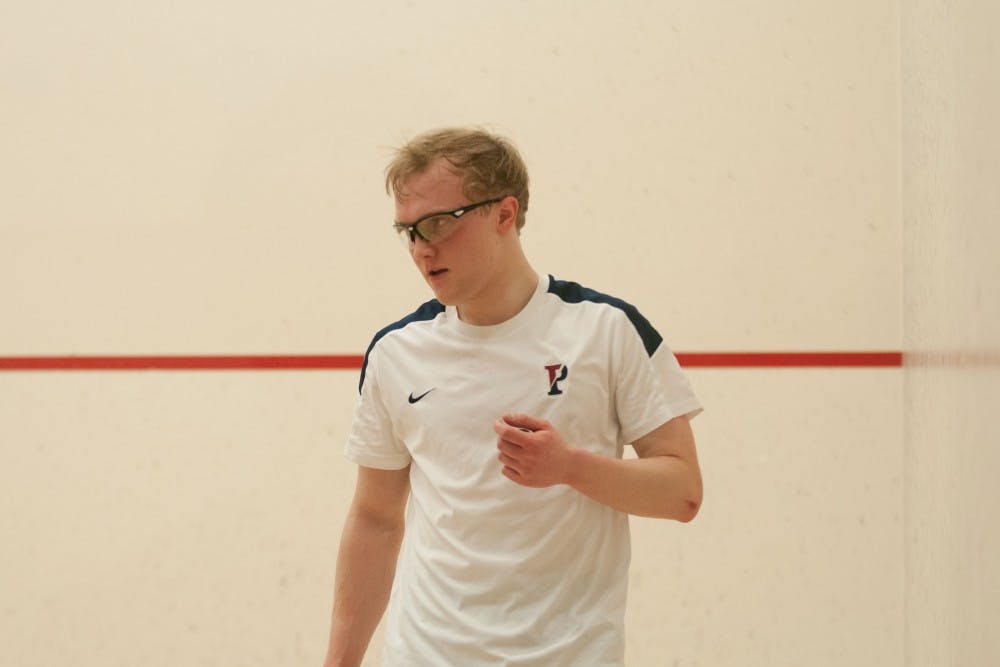
Junior Anders Larsson is a fixture on the Penn men's squash ladder, but his first love was chess.
Credit: Corey HenryFirst is the worst, second is the best, third is the one who’s best at chess. That may not be the way the nursery rhyme goes, but for one Penn men’s squash player, the saying rings true.
Junior Anders Larsson has been involved with squash for quite a long time, but for such a physically taxing sport, one of his greatest assets comes from his time playing a board game: chess.
For Larsson, chess was a part of his life long before squash came into the picture. From the tender age of three, the junior took on the task of becoming a skilled player in an attempt to beat his father. Watching his older brother and dad play from the sidelines only motivated him to become talented enough to compete with his fellow family members.
“I made him play me every day and would play throughout the day to get better,” Larsson said.
It didn’t take long before Larsson found himself on the winning end against his old man by the time he was five. Things started to pick up as the family searched for new competition to take on their talented son.
“After I beat [my dad] I went to my first chess tournament,” Larsson recalled. “I actually ended up beating the best player in the country for my age group.”
From there, the Brooklyn native became a fixture at the upper echelon of his age group. From the age of five to 11, Larsson was consistently ranked in the top three in the U.S.A. for his age group and No. 12 in the world for the same grouping. Aside from the glory and high rankings, another draw came from what Wu-Tang Clan says rules everything around them.
“Up until I was 12 I was making money playing chess which was really exciting,” Larsson said. “A lot of the New York chess clubs had tournaments where you would compete with those in your age group for money.”
By the age of 12, Larsson’s Elo ranking was 1776, which was good enough for No. 9 in the nation for his age group. For reference, the rating is only 2 classes below where a US chess master would be ranked, which would be about a 2000 rating. Around his teenage years, chess began to take a back seat to make room for his newest passion: squash.
“When I hit my teenage years I decided to focus on squash more since I was doing them both,” Larsson said. “Chess became less fun so I kind of let it taper off.”
While he maintains that he was much better at chess than squash, the junior went on to enjoy plenty success in squash by winning the 2012 U-17 Boys National Title and finishing third in the U-17 US Open that same year. Chess was still part of his life from time to time, but as the years wore on the focus became more on athletics.
Coming to Penn in 2014, Larsson was immediately thrown into the lion’s den as a freshman playing in the top half of the ladder for a very young team fighting to establish itself as an elite national program. To deal with the pressure of competing with some of the nation’s best squash players, the best remedy was utilizing some of the same mental gymnastics used to become an elite chess player.
“Chess is all about being focused and super relaxed,” Larsson explained. “If I ever really need to focus I can think about squash for an hour and a half and not be mentally fatigued by the end of it.”
From utilizing mental gymnastics to keeping squash’s importance in perspective, Penn’s current No. 7 has used a cerebral approach to keep his game sharp.
Outside of the occasional competitions with the Penn Chess Club, Larsson has largely confined his games to friends and co-workers who make the mistake of challenging him to a game as well as New York subway stops that have chess sets up. His fellow Penn squash teammates have so far avoided taking on the Brooklyn native on the checkered court, but that hasn’t stopped them talking a little smack.
The season is a marathon not a sprint, and with his chess experience under his belt, Larsson should find himself mentally fresh by the time the most important matches of the year roll around.
The Daily Pennsylvanian is an independent, student-run newspaper. Please consider making a donation to support the coverage that shapes the University. Your generosity ensures a future of strong journalism at Penn.
Donate



